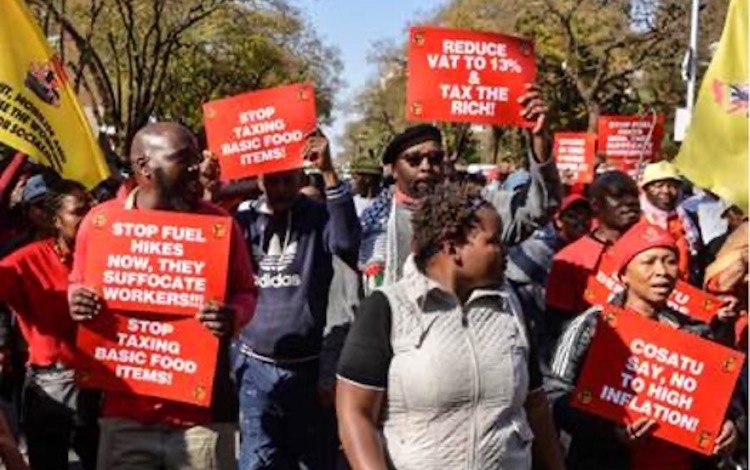By Lisa Vives, Global Information Network
NEW YORK | PRETORIA (IDN) — “We cannot breathe, comrades. We cannot breathe when today it costs more than $277 to buy food for a family of just four people. No!”
That was Moalusi Tumane, a schoolteacher in Palm Ridge, east of Johannesburg, speaking to some 1,000 workers who marched last week to the seat of government in South Africa’s capital Pretoria to protest the country’s soaring cost of living, including record-high fuel prices and more expensive basic foods.
“We cannot stay at the same salary when everything has doubled up,” complained Linda Gumede, also a schoolteacher told a reporter. “Cooking oil has tripled-up. How can I buy everything when I have nothing?”
The march was led by the country’s largest unions who called for a “total shutdown” of the economy in protest against high unemployment and rising fuel and electricity costs. They blame the ruling party, the ANC, for the poor state of the country’s economy.
Members of the unions marched across all nine provinces, singing songs from the country’s liberation struggle. The largest rallies were reported in Cape Town and Pretoria.
Like in the U.S., inflation has accelerated to its highest level in 13 years in July, pushed mainly by surging prices for food, transport and electricity.
Foodstuffs that many people rely on have gone up by 10 per cent in the last year alone.
Prices for bread and cereals were up by 13.7 per cent in July from 11.2 percent in June. It means a loaf of white bread now costs $1.05 compared with $0.91 one year ago, StatsSA said.
The price of fuel increased by 56.2 per cent from last year and the jobless rate hovers near 34 per cent.
Meanwhile, the social architecture formed over more than three centuries of white rule has maintained South Africa’s position as the world’s most unequal society, according to the Thomas Piketty-backed World Inequality Lab.
Attempts by the now-democratic government to wipe away the legacy of apartheid and colonialism have failed to narrow the imbalance between rich and poor, with 3,500 adults owning more than the poorest 32 million people in the country of 60 million, it said in a report.
“There is no evidence that wealth inequality has decreased since the end of apartheid,” the group said. “Asset allocations before 1993 still continue to shape wealth inequality.”
“It is time to abolish human exploitation once and for all,” said Audrey Azoulay, director general of UNESCO, speaking on August 23, the International Day for the Remembrance of the Slave Trade and its Abolition. “Today, let us remember the victims and freedom fighters of the past so that they may inspire future generations to build just societies.” [IDN-InDepthNews – 29 August 2022]
Photo source: Global Information Network
IDN is the flagship agency of the Non-profit International Press Syndicate.
This article is published under the Creative Commons Attribution 4.0 International licence. You are free to share, remix, tweak and build upon it non-commercially. Please give due credit.

